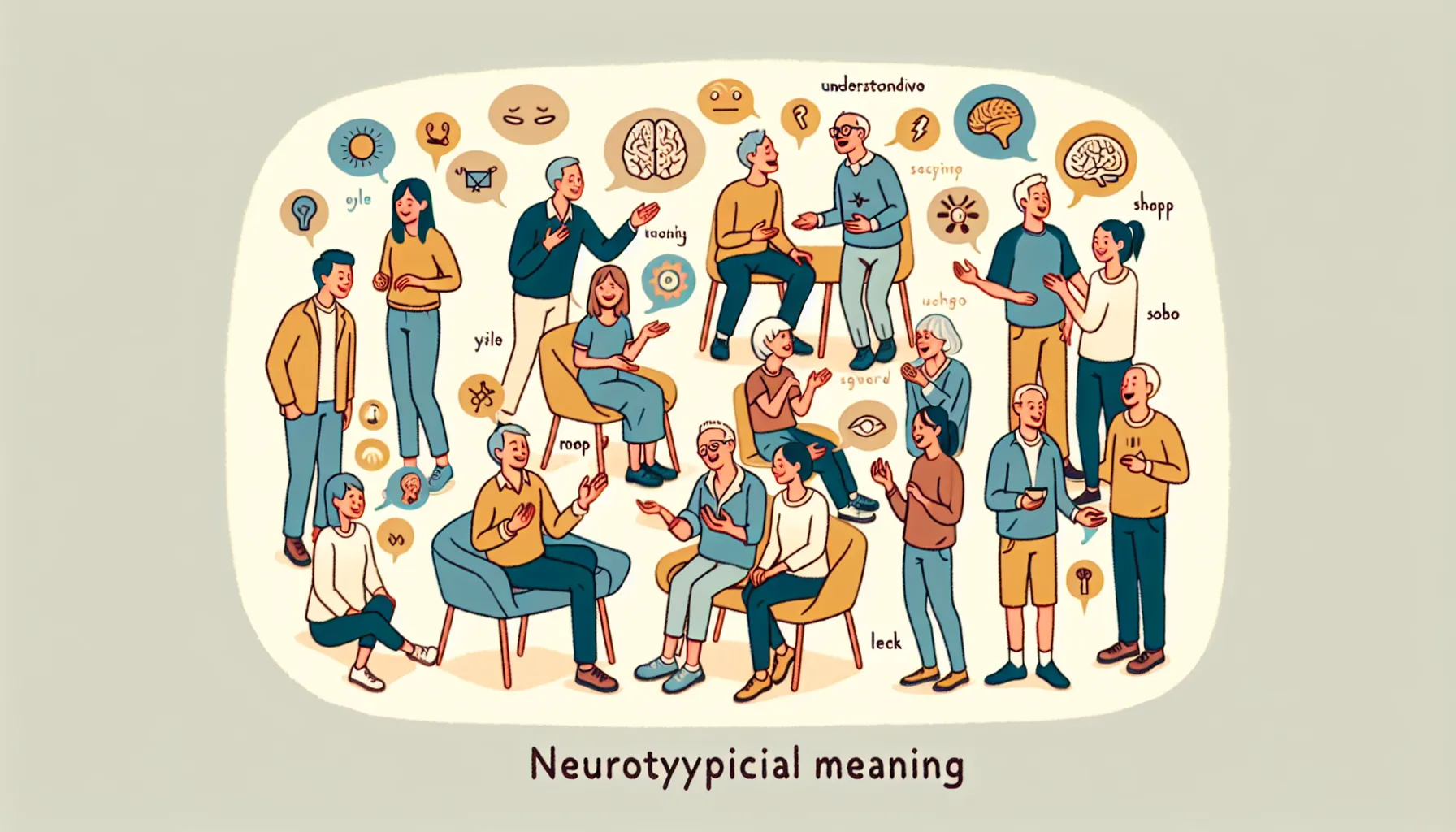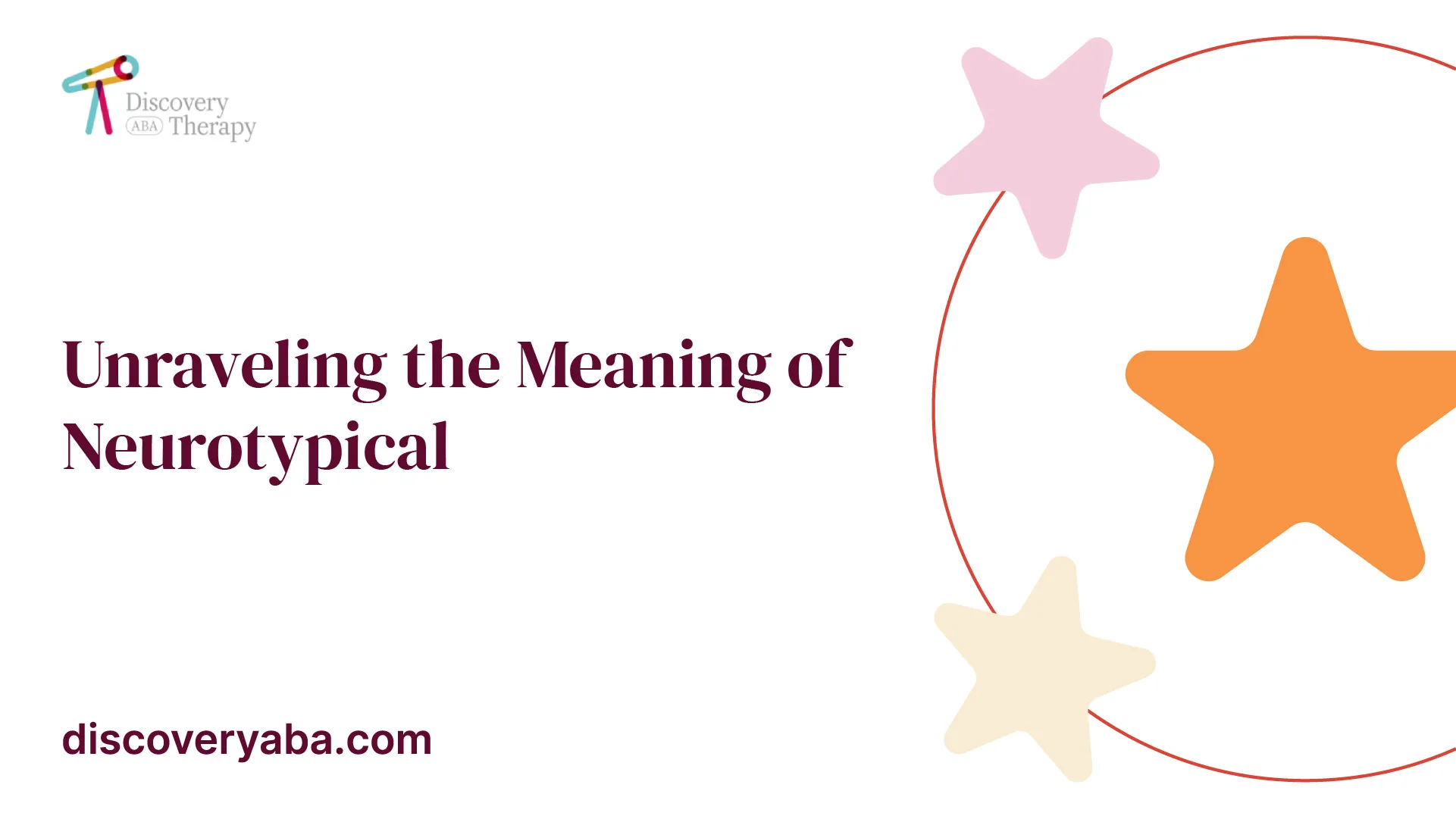Unraveling the Meaning of Neurotypical
Unravel the meaning of neurotypical and discover the power of neurodiversity. Explore cognitive abilities, embrace inclusion, and challenge stereotypes.

Understanding Neurotypical vs. Neurodivergent
To comprehend the concept of neurotypical and neurodivergent, it is essential to define these terms and explore the concept of neurodiversity.
Defining Neurotypical and Neurodivergent
Neurotypical refers to individuals whose strengths and challenges are not affected by any differences that change how their brains work, as mentioned by the Cleveland Clinic. It is important to note that the term "neurotypical" does not specifically refer to any particular group, such as those with autism spectrum disorder, but rather describes individuals with typical neurological development or functioning.
On the other hand, neurodivergent individuals exhibit differences in brain function that can affect their strengths and challenges. These differences can encompass a wide range of conditions, such as autism, attention deficit hyperactivity disorder (ADHD), dyslexia, and others [2]. Neurodivergent individuals may possess unique cognitive abilities and talents that set them apart from neurotypical individuals. For example, they may excel in areas such as memory, spatial visualization, or complex mathematical calculations.

Neurodiversity Concept
The concept of neurodiversity advocates for an inclusive perspective that recognizes the wide spectrum of ways people think. It reframes differences in cognition as variations that are equally normal and valuable. Neurodiversity emphasizes acceptance and inclusion, acknowledging that diverse minds are an integral part of humanity.
By embracing neurodiversity, society can move away from labeling certain cognitive variations as better or worse. Instead, it acknowledges that all brains function differently and that these differences contribute to the richness and diversity of human experiences. The concept of neurodiversity goes beyond the binary of neurotypical and neurodivergent, recognizing that every individual's brain has unique strengths and challenges.
Understanding the distinction between neurotypical and neurodivergent is crucial in fostering a more inclusive and accepting society. By recognizing and appreciating the diversity of cognitive functioning, we can create an environment that values the strengths and contributions of all individuals, regardless of their neurological differences.
Strengths of Neurodivergent Individuals
Neurodivergent individuals, who have brains that function differently from the neurotypical population, possess unique strengths and abilities. Understanding and recognizing these strengths is essential for fostering inclusivity and celebrating the diversity of human cognition.
Cognitive Abilities
Neurodivergent individuals often exhibit exceptional cognitive abilities that can be harnessed and appreciated. Some of these cognitive strengths include:
- Enhanced memory: Many neurodivergent individuals have a remarkable capacity for memory, allowing them to recall information with great accuracy and detail.
- Spatial reasoning: Some neurodivergent individuals possess a natural aptitude for mentally visualizing objects and spatial relationships, making them skilled at tasks requiring 3D thinking and problem-solving.
- Analytical thinking: The ability to excel in analytical thinking and problem-solving is often observed in neurodivergent individuals, enabling them to approach complex tasks with unique perspectives and solutions.
- Specialized interests: Neurodivergent individuals frequently develop intense interests or passions in specific subjects. This focused attention can lead to in-depth knowledge and expertise in their chosen fields.
Unique Skills and Talents
Every neurodivergent individual has their own set of distinct skills and talents that should be acknowledged and celebrated. Some of these unique strengths may include:
- Attention to detail: Neurodivergent individuals often exhibit a keen eye for detail, enabling them to notice nuances and patterns that others might overlook. This attention to detail can be especially valuable in tasks that require precision and accuracy.
- Creative thinking: Many neurodivergent individuals possess heightened creativity, allowing them to think outside the box and offer innovative solutions to problems.
- Strong focus: Neurodivergent individuals often demonstrate remarkable focus and concentration when engaged in activities that captivate their interest, enabling them to achieve exceptional results.
- Dedication and perseverance: When neurodivergent individuals are passionate about a particular pursuit, they frequently display extraordinary dedication and perseverance, allowing them to overcome challenges and achieve their goals.
Recognizing and appreciating these strengths helps dispel misconceptions and stereotypes surrounding neurodivergent individuals. It highlights the valuable contributions they can make in various domains, including education, employment, and creative endeavors. Embracing neurodiversity means acknowledging and celebrating the diverse talents and strengths that every individual possesses, regardless of their cognitive differences.
Importance of Embracing Neurodiversity
Recognizing and embracing neurodiversity is essential for fostering success, happiness, and fulfilling career aspirations. Understanding and accepting the concept of neurodiversity allows individuals to focus on their strengths and unique abilities, leading to positive outcomes.
Success and Happiness
Research indicates that embracing neurodiversity helps neurodivergent individuals adapt and succeed, ultimately leading to increased happiness [2]. By recognizing and valuing the diverse ways in which individuals think, learn, and process information, we can create inclusive environments that allow neurodivergent individuals to thrive.
Neurodivergent individuals often possess exceptional cognitive abilities, such as attention to detail, strong memory, and creativity. These unique strengths contribute to their success in various fields and can be harnessed for personal and professional growth.
Career Aspirations
Embracing neurodiversity is particularly important in the context of career aspirations. Many accomplished and successful individuals are neurodivergent, and there is a growing recognition of the value they bring to the workplace [2]. Major corporations are adapting their hiring processes to accommodate neurodivergent individuals, realizing the competitive advantage they offer.
By creating inclusive work environments that celebrate neurodiversity, organizations can tap into a diverse pool of talent and benefit from the unique perspectives and problem-solving skills of neurodivergent individuals. This not only fosters innovation but also enhances overall team performance.
It is important to challenge stereotypes and promote a shift in societal attitudes towards neurodiversity. By embracing the strengths and abilities of neurodivergent individuals, we can create a more inclusive and supportive society that values the contributions of all its members.
Understanding the importance of embracing neurodiversity in terms of success, happiness, and career aspirations allows us to foster an environment where everyone can thrive and reach their full potential. By recognizing and celebrating the unique strengths of neurodivergent individuals, we can create a society that embraces diversity and truly appreciates the richness it brings.
Recognizing Neurodiversity in Society
In society, it is crucial to recognize and embrace neurodiversity, acknowledging the unique strengths and perspectives of neurodivergent individuals. This section focuses on two aspects of recognizing neurodiversity in society: workplace adaptations and the competitive advantage it brings.
Workplace Adaptations
Major corporations and organizations are increasingly adapting their workplaces to accommodate neurodivergent individuals, recognizing the value they bring to the workforce. By implementing workplace adaptations, employers can create an inclusive environment that allows neurodivergent individuals to thrive.
One common adaptation is providing clear communication channels. Neurodivergent individuals may have different communication styles and preferences. Ensuring that communication is direct, transparent, and structured can help foster effective collaboration and understanding in the workplace.
Another important workplace adaptation is providing sensory-friendly environments. Sensory sensitivities are common among neurodivergent individuals. By creating spaces that minimize sensory overload, such as reducing noise levels and providing comfortable lighting, employers can support the well-being and productivity of their neurodivergent employees.
Additionally, employers can offer flexible work arrangements. Neurodivergent individuals may benefit from flexible schedules or remote work options, allowing them to manage their unique needs and optimize their performance.
Competitive Advantage
Neurodivergent individuals bring a range of unique strengths and skills to the table, providing organizations with a competitive advantage [2]. By embracing neurodiversity, companies can tap into this talent pool and foster innovation, creativity, and problem-solving.
The cognitive abilities of neurodivergent individuals often include exceptional attention to detail, pattern recognition, and out-of-the-box thinking. These qualities can be invaluable in fields such as technology, science, engineering, and design, where complex problem-solving and innovation are crucial.
Moreover, neurodivergent individuals often possess unique skills and talents that can greatly benefit organizations. These skills may include exceptional memory, heightened sensory perception, and expertise in specific areas of interest. By leveraging these strengths, companies can gain a competitive edge and foster a diverse and dynamic workforce.
Recognizing the competitive advantage that neurodiversity brings to the workplace requires a shift in mindset and a commitment to inclusivity. By creating an environment that values the contributions of neurodivergent individuals, organizations can foster innovation, creativity, and a culture of acceptance.
By recognizing neurodiversity in society, embracing workplace adaptations, and leveraging the competitive advantage it brings, we can create a more inclusive and diverse world that celebrates the strengths and talents of all individuals.
Impact of Stereotypes on Neurodiversity
Stereotypes surrounding neurodiversity can have a profound impact on the lives of neurodivergent individuals, directly influencing their quality of life. These stereotypes often lead to altered perceptions and treatment of individuals who fall under the neurodivergent umbrella. It is crucial to address and dispel these harmful stereotypes to foster inclusivity and create a more understanding society.
Altered Lives
Stereotypes about neurodiversity can greatly impact the lives of neurodivergent individuals. These stereotypes often lead to misconceptions and judgments that can result in exclusion, discrimination, and stigmatization. Neurodivergent individuals may face challenges in accessing resources, activities, and services due to the fear of being stigmatized or grouped with others based on these stereotypes. This exclusion can have a detrimental effect on their overall well-being and limit their opportunities for personal growth and development.
Quality of Life
The impact of stereotypes on neurodiversity directly affects the quality of life for neurodivergent individuals. Negative stereotypes can contribute to the social marginalization of neurodivergent individuals, leading to feelings of isolation and loneliness. Research has shown that neurotypical individuals may have biases against neurodivergent individuals, even when they are not aware of their diagnosis. For example, studies have found that neurotypical individuals may express a preference for interacting with other neurotypical individuals over neurodivergent individuals due to perceived awkwardness and a perceived lack of empathy.
The impact of these stereotypes is further amplified in social settings, as social favorability ratings significantly influence the acceptance and inclusion of neurodivergent individuals. Neurotypical individuals tend to rate neurotypical targets more favorably and exhibit a stronger willingness to interact with them compared to neurodivergent targets. This bias can have a significant impact on the social interactions and acceptance that neurodivergent individuals experience.
By challenging and debunking stereotypes surrounding neurodiversity, society can create a more inclusive and supportive environment for neurodivergent individuals. Promoting understanding, empathy, and acceptance can help improve the overall quality of life for neurodivergent individuals, allowing them to thrive and contribute their unique perspectives and talents to society.
Neurodiversity Movement and Initiatives
The neurodiversity movement has gained momentum over the years, aiming to connect neurodivergent individuals and advocate for their inclusion in society. This movement recognizes that there is no one "right" way of thinking, learning, and behaving, emphasizing that differences are not considered deficits but rather unique aspects of human diversity. Neurodiversity celebrates the talents, strengths, and contributions of individuals across the neurodivergent spectrum [5].
Connecting Neurodivergent Individuals
One of the key objectives of the neurodiversity movement is to foster connections among neurodivergent individuals. This is achieved through various forums, online platforms, and support networks. These platforms provide spaces for individuals to share their experiences, challenges, and achievements, fostering a sense of belonging and community. Connecting with others who understand their unique neurotype can be empowering and validating for neurodivergent individuals, helping to reduce feelings of isolation and promoting self-acceptance.
Advocating for Inclusion
Another important aspect of the neurodiversity movement is advocating for the inclusion of neurodivergent individuals in all aspects of life. This includes education, employment, healthcare, and social environments. The movement seeks to challenge stereotypes and misconceptions surrounding neurodivergent individuals, promoting acceptance and understanding.
Inclusive initiatives aim to create environments that accommodate the diverse needs and strengths of neurodivergent individuals. This may involve providing reasonable accommodations, such as flexible work arrangements or sensory-friendly spaces, to ensure equal opportunities for participation and success. By embracing neurodiversity, society can benefit from the unique perspectives and contributions of individuals across the neurodivergent spectrum.
The neurodiversity movement has also led to the establishment of awareness campaigns and celebrations to promote understanding and acceptance. For example, Neurodiversity Celebration Week, founded by Siena Castellon, an autistic teenager with multiple diagnoses, aims to highlight the strengths, skills, and talents of neurodivergent individuals, challenging misconceptions and promoting a more inclusive society.
By connecting neurodivergent individuals and advocating for their inclusion, the neurodiversity movement strives to create a more accepting and inclusive society. It challenges traditional notions of "normal" and recognizes that diverse minds are an integral part of humanity. Embracing neurodiversity not only benefits neurodivergent individuals but enriches society as a whole by promoting understanding, acceptance, and the celebration of human diversity.
References
- https://www.healthline.com/health/neurotypical
- https://my.clevelandclinic.org/health/symptoms/23154-neurodivergent
- https://www.medicalnewstoday.com/articles/what-does-neurotypical-mean
- https://www.ncbi.nlm.nih.gov/pmc/articles/PMC8992906/
- https://www.autismparentingmagazine.com/neurodiversity-stereotypes/
Does Your Child Have An Autism Diagnosis?
Learn More About How ABA Therapy Can Help
Find More Articles
Contact us
North Carolina, Nevada, Utah, Virginia
New Hampshire, Maine
Arizona, Colorado, Georgia, New Mexico, Oklahoma, Texas
.avif)




































































































